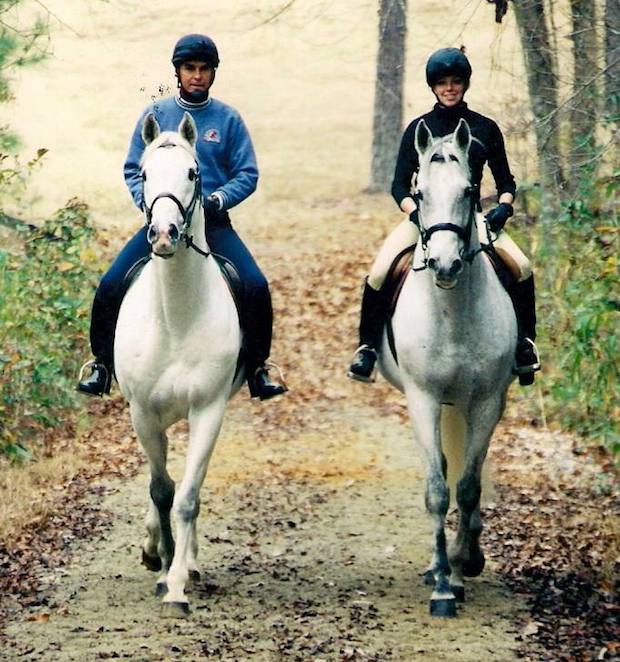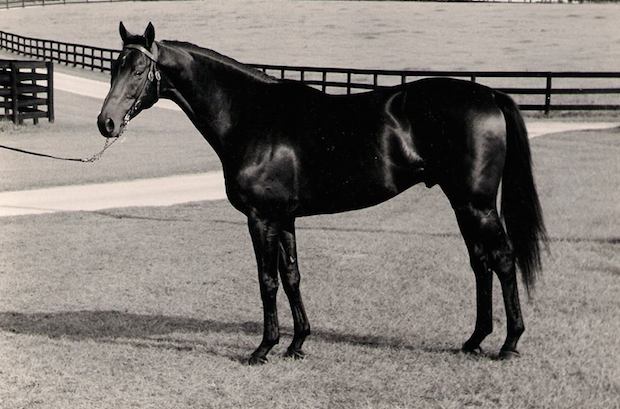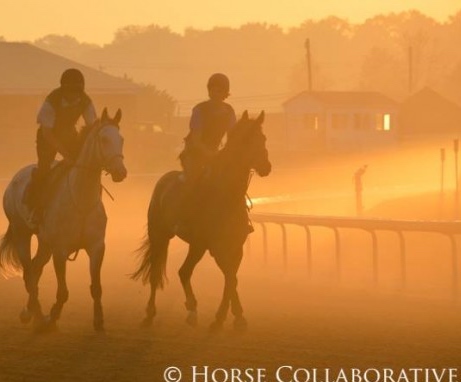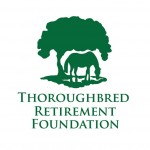
Multiple stakes winners Silver Comet, by Flip Sal and Loyal Pal, by Caro. Photo courtesy Horse Collaborative
BY DENNY EMERSON —I am well aware that many people have mixed emotions about horse racing. The industry has a reputation for pushing too many young horses too hard at too young an age, with too many getting injured in the process, and that’s a valid criticism.
I also believe, though, that modern sport horses in general, most of which are at least part thoroughbred, would be LESS tough and hardy and athletic WITHOUT racing being used as a tough filtering system to find out which horses can handle all the athletic stresses, because the winners tend to breed on, and the losers don’t.
I’ve stood lots of former racehorses as stallions and I’ve ridden dozens of thoroughbreds, and I happen to think there is a strong correlation between racing class and general athletic class.
I just read a piece about how the “dirty little secret” of modern thoroughbred breeding is “fragile ankles,” horses being bred for speed with little consideration being given to genetically proven soundness in the bloodlines.
And maybe some of that is true, but it’s far from the whole story.
Morgans and Arabians don’t have huge bone, yet some of these little horses can pull off huge feats of endurance, but what underlies this is literally YEARS of slow, incrementally increasing work. Something the racing thoroughbreds, regardless of pedigree CAN’T have if they race at two and three, because they literally haven’t lived for enough years.
Fitness staves off (doesn’t prevent) the likelihood of injury, and fitness takes more time than the flat racing industry generally allows.
If there IS a “dirty little secret” in the racing industry, I would think it’s too fast too early, without building in the years of needed slow work, but THAT really isn’t a secret. People have been saying that forever.
So, whatever the breed, whatever the use, first get them fit. THEN ask the harder questions. Don’t hope to get them fit as you push them to run or jump or slide or spin or compress and lift or collect. That approach is backwards, and it will so often backfire on you, and all you will wind up with is another hurt or demoralized horse.

Big time stakes winner O’Hara, by Ballymoss. Loaned to us back in the 1970s by Thornmar Farm. Photo courtesy Horse Collaborative
The REAL “dirty little secret” (and not just in racing) is ignorant or impatient humans.
So for me, racing is that old saying, “a mixed bag,” lots of good, but plenty also that needs to be fixed.
Can horses have long racing careers and come off the track sound and sane? You bet. I have several at our farm right now. Can racing break some down? You bet. So it’s not an easy call.
About the Author
Named “One of the 50 most influential horsemen of the Twentieth Century” by The Chronicle of the Horse, Denny Emerson was elected to the USEA Hall of Fame in 2005. He is the only rider to have ever won both a gold medal in Eventing and a Tevis Buckle in endurance. He is a graduate of Dartmouth College and author of How Good Riders Get Good, and continues to ride and train from his Tamarack Hill Farm in Vermont and Southern Pines, NC.
About Horse Collaborative: The Horse Collaborative is a new platform for horse people to connect and share with friends. Since launching in 2012, the Horse Collaborative has quickly cultivated and connected a passionate international community of horse lovers, athletes, equine professionals, hobbyists, dreamers, and people who just think horses are cute.
— Photo and story reprinted by Off Track Thoroughbreds with permission of Denny Emerson and the Horse Collaborative.



Jill so so right. Studies have confirmed this and we have followed a strict regime with our yearlings as advised by our vet 13 years ago with great results. But you are right about the horse man ship it is the key factor. We race very few 2year olds but those we have have won and been looked after for the next season. The horses that we have the most problem with are those left I the paddock to mature they don’t they don’t lay down good bone through controlled diet and work and there bones are soft and they always have issues mainly shine sore , time and again. Unless a forced needs a one time off due to a problem , it’s not good for them to have more than 6 weeks or their bones soften ( is a correct word for this can’t remember at moment) . The most annoying thing for me his we get lumped into a basket of horses breaker downers. There will always be a factor of people with any animal that it will not ever stop that. But why would you want to break down your horse ours may race but they are our babies I wish I had a crystal ball so that I could see something happening in the future and stop it I don’t. And horses break bones cantering around the paddock nothing to do with humans.
SEAWARD COTTAGE in July 2015 in her very first start came home last – not unusual. However, she came home last by forty-five (45) lengths which appears to indicate that she had a health issue and/or a training/management issue. She was a 3 year old and raced for only five (5) months starting 7 times. Doug O’Neill was her owner and trainer for a while. Then on Jan 3, 2016, when in training, she suffered multiple fractures in her left foreleg.
Her fetlock (ankle) BROKE, her carpus (knee) BROKE and her humerus (shoulder) BROKE – oh what a sickening sight it must have been. And as for her horrific pain and suffering – for how long? In my experience there is not a vet on duty when training is taking place (unlike raceday) and I have witnessed a horse break down in training when there was no vet around and we had to wait so long for the vet to get there – it was unbearable.
One can only come to the conclusion that she had a serious bone issue. Some simple veterinary tests would’ve detected a bone problem before she began her racing career. But then again she was just a commodity and was bred to race despite the fact that it was on the cards that she might die in a race, in training or end up in the slaughterhouse.
Re 2 year old racing
The 2013 Australian study on 2 year old racing was not independent of the horseracing industry. The vet who conducted such study has been an employee of the racing authority in my State for over 17 years. Most study/research/statistics funded and published by the racing industry will always find for horseracing……. vested interests.
All it would take would be backing up the Triple Crown and Breeder’s Cup races to be for 5 year olds. I understand the money argument, but if the rules were changed, the sport WOULD adjust.
Statistics actually show that horses who raced as 2 yos suffer fewer catastrophic breakdowns as older horses. I believe this can be attributed to good ol’ Mother Nature–the bones of young horses can remodel to account for the stress they encounter. The more stress the young horse encounters on a routine (but not abusive) basis, the more the calcium is deposited to strengthen those bones. This can only happen while the horse is still developing. It DOES take a good horseman to bring a 2 yo along properly, though, as muscles strengthen more quickly than tendons and ligaments, which strengthen more quickly than bones.
thank you for this article.
I have thought this about horse racing, and about horse sports as a whole for nearly two decades of my life now.
Yes there are bad players in horse racing. But for those of us that have “been around” and watched with open eyes. We know that these people are in each sport.
To constantly make the Thoroughbred breeders, trainers, owners and fans of the sport and breed, the villains is, in a way making it ok for the very same thing to happen elsewhere.
Abuse happens. It’s beyond time for every discipline and breed, to stand up, take notice and to call those people out.